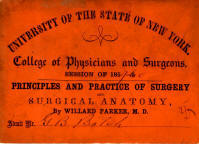Willard Parker, M.D.
Click image to enlarge
PARKER, Willard, surgeon, born in Hillsborough, New Hampshire, 2 September, 1800; died in New York city, 25 April, 1884. His ancestors emigrated to Massachusetts in 1640 and settled in Chelmsford, to which place his father returned when Willard was five years old. He taught in the district schools to obtain means to enter Harvard, where he was graduated in 1826. He then opened a school in Charlestown with the intention of studying for the ministry, but subsequently decided to adopt the profession of medicine, became the private pupil of Dr. John C. Warren, attended medical lectures in Boston, and took his degree at Harvard in 1830. The year before he had been appointed lecturer on anatomy in the Vermont medical college, and immediately after his graduation he became professor of the same branch in Berkshire medical college, Pittsfield, Massachusetts Three years later he accepted the chair of surgery there, which he held till 1836, when he removed to Cincinnati, Ohio, to become professor of surgery in the medical college of that city. He spent several months in Europe in 1837, and in 1839 settled in New York city, with the appointment of professor of surgery in the College of physicians and surgeons, which he held for thirty years, subsequently accepting the chair of clinical surgery, which he resigned a few months before his death. During the next ten years he established a large and lucrative practice, and took the highest rank in his profession. His remarkable success was based on great knowledge and skill, and his mode of treatment, which inspired the absolute faith of his patients. All the important operations that are only undertaken by great surgeons were performed by him with more than ordinary success. He made many important discoveries in practical surgery, including that of cystotomy and that for the cure of abscess of the appendix vermiformis. His operation for laceration of the perinceum during parturition is regarded as an important advance in the science of surgery. He was the first in this country to call attention to the phenomena of the concussion of the nerves as distinguished from that of the nerve-centres, and in 1854 was also the first to describe and report cases of malignant pustule. In the spring of 1840, appreciating the want of practical demonstration in teaching surgery, and the difficulty in securing eases for illustration in colleges that were unconnected with hospitals, he visited with his students two or three of the city dispensaries, selected interesting eases, and had them taken to the College of physicians and surgeons, where the anatomical theatre offered superior advantages for making diagnoses and performing operations before the class. This was the first college clinic in the United States. He was active in the organization of the New York pathological society in 1843, of that for the relief of widows and orphans of medical men in 1846, and of the New York academy of medicine in 1847, becoming its president in 1856, and holding office for many years.In 1846, with Dr. James R. Wood, he secured the necessary legislation to reorganize the city almshouse into what is now Bellevue hospital, and was appointed one of its visiting surgeons. In 1856 he was chosen to a similar post in the New York hospital. In 1864-'6 he was active in procuring legislation to create the New York city board of health, made many visits to Albany in its behalf, and was one of its members from its organization. On the death in 1868 of Dr. Valentine Mott, who was president of the New York state inebriate asylum at Binghamton, Dr. Parker was appointed his successor, and became interested in this field of work. His administration proved eminently successful, his treatment of his patients being based on the theory that alcohol is essentially a poison, that it cannot be considered as food, and should be used only in exceptional cases and under the advice of a physician. Dr. Parker continued to practice within two years of his death, and was consulting surgeon to Bellevue, Mount Sinai, St. Luke's, Roosevelt, and the New York hospitals. He was a member of many foreign and domestic professional bodies, active in benevolent and religious organizations, and the friend of education. As a teacher he enjoyed the highest success, his fine personal presence and affable manners winning the regard of his pupils, and his direct and lucid way of imparting information securing their attention. Princeton gave him the degree of LL.D. in 1870. The Willard Parker hospital for contagious diseases was erected and named in his honor. Few American surgeons have filled so acceptably. so large a number of responsible offices His extensive practice prevented his giving much time to writing, and even the reports of his eases have been made by other physicians, but he published several monographs in medical journals, among which are "Cystotomy" (1850) ; "Spontaneous Fractures" (1852); "On the High Operation for Stone in the Female" (1855) ; "The Concussion of Nerves" (1856);" Ligature of the Subclavian Artery" (1864) ; and a lecture on "Cancer" (1873).
Edited Appletons Encyclopedia, Copyright © 2001 VirtualologyTM_______________
From Bellevue Hospital:
1868 Parker,* Willard, 1884.
A. B., Harvard, 1826; A. M., 1829; M. D., 1830; LL.D., Princeton, 1870; House Phys., U. S. Marine Hosp., Chelsea, Mass., 1827; Prof. Surg., Berkshire, 1832; Cincin., 1836; Prof. Clin. Surg., Coll. Phys. & Surg., N. Y., 1870-81; Emeritus, 1881-84. Died in N. Y. City, 1884, aet. 84; cause, cystitis and pyelitis.
________________
Surgeon.—Born in Hillsboro, N. H., Sept. 2, 1800.—A. B. H. U. '26, A. M. '29, M. D. '30; I,L.D. Princeton '70.—House Phys. U. S. Marine Hosp., Chelsea, Mass., '27. Prof. Surg. Berkshire '32. Cincinn. '36. Prof. Clinic. Surg. Coll P. and S. '7o-'81. Emeritus '81-'84.—Cons. Surg. Bell. Hosp. '68-'84,—Died N. Y. '84, of cystitis and pyelitis.
